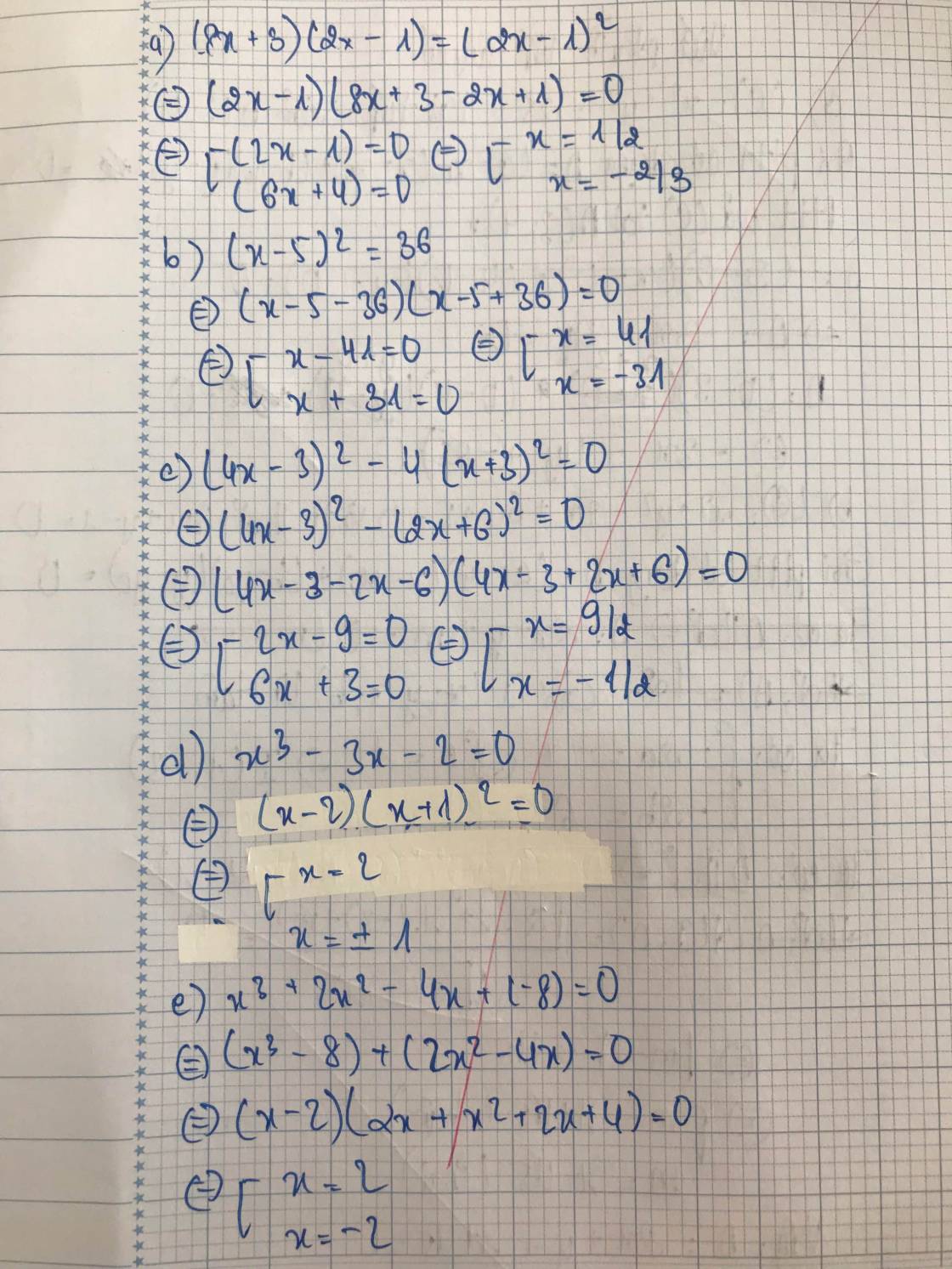Hãy nhập câu hỏi của bạn vào đây, nếu là tài khoản VIP, bạn sẽ được ưu tiên trả lời.

a, \(\left(x^2-5x+7\right)^2-\left(2x-5\right)^2=0\)
\(\Leftrightarrow\left(x^2-5x+7-2x+5\right)\left(x^2-5x+7+2x-5\right)=0\)
\(\Leftrightarrow\left(x^2-7x+12\right)\left(x^2-3x+2\right)=0\)
\(\Leftrightarrow\left(x-4\right)\left(x-3\right)\left(x-1\right)\left(x-2\right)=0\Leftrightarrow x=1;x=2;x=3;x=4\)
Vậy tập nghiệm phương trình là S = { 1 ; 2 ; 3 ; 4 }
b, \(\left|2x-1\right|=5\Leftrightarrow\left[{}\begin{matrix}2x-1=5\\2x-1=-5\end{matrix}\right.\Leftrightarrow\left[{}\begin{matrix}x=3\\x=-2\end{matrix}\right.\)
Vậy tập nghiệm của phương trình là S = { -2 ; 3 }
c, \(\left|2x-1\right|=\left|x+5\right|\Leftrightarrow\left(2x-1\right)^2=\left(x+5\right)^2\)
\(\Leftrightarrow\left(2x-1\right)^2-\left(x+5\right)^2=0\Leftrightarrow\left(2x-1-x-5\right)\left(2x-1+x+5\right)=0\Leftrightarrow x=6;x=-\dfrac{4}{3}\)
Vậy tập nghiệm của phương trình là S = { -4/3 ; 6 }
d, \(\left|3x+1\right|=x-2\)
TH1 : \(3x+1=x-2\Leftrightarrow2x=-3\Leftrightarrow x=-\dfrac{3}{2}\)
TH2 : \(3x+1=-x+2\Leftrightarrow4x=1\Leftrightarrow x=\dfrac{1}{4}\)
Vậy tập nghiệm của phương trình là S = { -3/2 ; 1/4 }
các ý còn lại tương tự
a) Ta có: \(\left(x^2-5x+7\right)^2-\left(2x-5\right)^2=0\)
\(\Leftrightarrow\left(x^2-5x+7-2x+5\right)\left(x^2-5x+7+2x-5\right)=0\)
\(\Leftrightarrow\left(x^2-7x+12\right)\left(x^2-3x+2\right)=0\)
\(\Leftrightarrow\left(x-3\right)\left(x-4\right)\left(x-1\right)\left(x-2\right)=0\)
\(\Leftrightarrow\left[{}\begin{matrix}x-3=0\\x-4=0\\x-1=0\\x-2=0\end{matrix}\right.\Leftrightarrow\left[{}\begin{matrix}x=3\\x=4\\x=1\\x=2\end{matrix}\right.\)
Vậy: S={3;4;1;2}

- Thay lần lượt xo vào từng phương trình trên ta được kết quả sau :
+, Phương trình nhận xo là nghiệm : a, b, c, d, e .

\(a,=4x^2+4x+1\\ b,=9-12y+4y^2\\ c,=\dfrac{x^2}{4}-xy+y^2\\ d,=\dfrac{25}{4}-5x+x^2\\ e,=4x^2+32xy+64y^2\\ f,=9x^2-30xy+25y^2\)

a: =>9x^2+6x+1-6(2x^2-13x+21)=0
=>9x^2+6x+1-12x^2+78x-126=0
=>-3x^2+84x-125=0
=>\(x\in\left\{26.42;1.58\right\}\)
b: =>(3x+1)[(2x-5)^2-(x-3)^2]=0
=>(3x+1)(2x-5-x+3)(2x-5+x-3)=0
=>(3x+1)(x-2)(3x-8)=0
=>\(x\in\left\{-\dfrac{1}{3};2;\dfrac{8}{3}\right\}\)
c; =>(x+5)(0,75x-3+1,25x)=0
=>(x+5)(2x-3)=0
=>x=3/2 hoặc x=-5
Bài 1: Giải các bất phương trình sau
a) x+1/x+3 > 1
b) 2x-1/x-3 ≤ 2
c) x2+2x+2/x2+3 ≥ 1
d) 2x+1/x2+2 ≥ 1

a, \(\dfrac{x+1}{x+3}>1\Leftrightarrow\dfrac{x+1}{x+3}-1>0\Leftrightarrow\dfrac{x+1-x-3}{x+3}>0\)
\(\Rightarrow x+3< 0\)do -2 < 0
\(\Rightarrow x< -3\)Vậy tập nghiệm BFT là S = { x | x < -3 }
b, \(\dfrac{2x-1}{x-3}\le2\Leftrightarrow\dfrac{2x-1}{x-3}-2\le0\Leftrightarrow\dfrac{2x-1-2x+6}{x-3}\le0\)
\(\Rightarrow x-3\le0\)do 5 > 0
\(\Rightarrow x\le3\)Vậy tập nghiệm BFT là S = { x | x \(\le\)3 }
c, \(\dfrac{x^2+2x+2}{x^2+3}\ge1\Leftrightarrow\dfrac{x^2+2x+2}{x^2+3}-1\ge0\)
\(\Leftrightarrow\dfrac{x^2+2x+2-x^2-3}{x^2+3}\ge0\Rightarrow2x-1\ge0\)do x^2 + 3 > 0
\(\Rightarrow x\ge\dfrac{1}{2}\)Vậy tập nghiệm BFT là S = { x | x \(\ge\)1/2 }
mình ko chắc nên mình đăng sau :>
d, \(\dfrac{2x+1}{x^2+2}\ge1\Leftrightarrow\dfrac{2x+1}{x^2+2}-1\ge0\Leftrightarrow\dfrac{2x+1-x^2-2}{x^2+2}\ge0\)
\(\Rightarrow-x^2+2x-1\ge0\Rightarrow-\left(x-1\right)^2\ge0\)vô lí

a: =>4x-2x-2-3x-2=0
=>-x-4=0
=>x=-4
b: =>x+2-2x-2+x=0
=>0x=0(luôn đúng)
d: =>3x=3
hay x=1
e: =>2x=1
hay x=1/2
f: =>4x=-4
hay x=-1
g: =>3x=-3
hay x=-1

c: =>2x+3-5-4+x=0
=>3x-6=0
=>x=2
d: =>3x=3
hay x=1
e: =>2x=1
hay x=1/2
f: =>4x=-4
hay x=-1
g: =>3x=-3
hay x=-1
\(a,4x-2\left(x+1\right)=3x+2\\ \Leftrightarrow4x-2x-2-3x-2=0\\ \Leftrightarrow-x-4=0\\ \Leftrightarrow x+4=0\\ \Leftrightarrow x=-4\)
Vậy pt có tập nghiệm \(S=\left\{-4\right\}\)
\(b,x+2-2\left(x+1\right)=-x\\ \Leftrightarrow x+2-2x-2+x=0\\ \Leftrightarrow0=0\)
Vậy pt có tập nghiệm \(S=R\)
\(c,2\left(x+3\right)-5=4-x\\ \Leftrightarrow2x+6-5-4+x=0\\ \Leftrightarrow3x-3=0\\ \Leftrightarrow3x=3\\ \Leftrightarrow x=1\)
Vậy pt có tập nghiệm \(S=\left\{1\right\}\)
\(d,3x-2=1\\ \Leftrightarrow3x=3\\ \Leftrightarrow x=1\)
Vậy pt có tập nghiệm \(S=\left\{1\right\}\)
\(e,2x-1=0\\ \Leftrightarrow2x=1\\ \Leftrightarrow x=\dfrac{1}{2}\)
Vậy pt có tập nghiệm \(S=\left\{\dfrac{1}{2}\right\}\)
\(f,4x+3=-1\\ \Leftrightarrow4x=-4\\ \Leftrightarrow x=-1\)
Vậy pt có tập nghiệm \(S=\left\{-1\right\}\)
\(g,3x+2=-1\\ \Leftrightarrow3x=-3\\ \Leftrightarrow x=-1\)
Vậy pt có tập nghiệm \(S=\left\{-1\right\}\)

Bài 1
a) 5x²y - 20xy²
= 5xy(x - 4y)
b) 1 - 8x + 16x² - y²
= (1 - 8x + 16x²) - y²
= (1 - 4x)² - y²
= (1 - 4x - y)(1 - 4x + y)
c) 4x - 4 - x²
= -(x² - 4x + 4)
= -(x - 2)²
d) x³ - 2x² + x - xy²
= x(x² - 2x + 1 - y²)
= x[(x² - 2x+ 1) - y²]
= x[(x - 1)² - y²]
= x(x - 1 - y)(x - 1 + y)
= x(x - y - 1)(x + y - 1)
e) 27 - 3x²
= 3(9 - x²)
= 3(3 - x)(3 + x)
f) 2x² + 4x + 2 - 2y²
= 2(x² + 2x + 1 - y²)
= 2[(x² + 2x + 1) - y²]
= 2[(x + 1)² - y²]
= 2(x + 1 - y)(x + 1 + y)
= 2(x - y + 1)(x + y + 1)
Bài 2:
a: \(x^2\left(x-2023\right)+x-2023=0\)
=>\(\left(x-2023\right)\left(x^2+1\right)=0\)
mà \(x^2+1>=1>0\forall x\)
nên x-2023=0
=>x=2023
b:
ĐKXĐ: x<>0
\(-x\left(x-4\right)+\left(2x^3-4x^2-9x\right):x=0\)
=>\(-x\left(x-4\right)+2x^2-4x-9=0\)
=>\(-x^2+4x+2x^2-4x-9=0\)
=>\(x^2-9=0\)
=>(x-3)(x+3)=0
=>\(\left[{}\begin{matrix}x-3=0\\x+3=0\end{matrix}\right.\Leftrightarrow\left[{}\begin{matrix}x=3\\x=-3\end{matrix}\right.\)
c: \(x^2+2x-3x-6=0\)
=>\(\left(x^2+2x\right)-\left(3x+6\right)=0\)
=>\(x\left(x+2\right)-3\left(x+2\right)=0\)
=>(x+2)(x-3)=0
=>\(\left[{}\begin{matrix}x+2=0\\x-3=0\end{matrix}\right.\Leftrightarrow\left[{}\begin{matrix}x=3\\x=-2\end{matrix}\right.\)
d: 3x(x-10)-2x+20=0
=>\(3x\left(x-10\right)-\left(2x-20\right)=0\)
=>\(3x\left(x-10\right)-2\left(x-10\right)=0\)
=>\(\left(x-10\right)\left(3x-2\right)=0\)
=>\(\left[{}\begin{matrix}x-10=0\\3x-2=0\end{matrix}\right.\Leftrightarrow\left[{}\begin{matrix}x=\dfrac{2}{3}\\x=10\end{matrix}\right.\)
Câu 1:
a: \(5x^2y-20xy^2\)
\(=5xy\cdot x-5xy\cdot4y\)
\(=5xy\left(x-4y\right)\)
b: \(1-8x+16x^2-y^2\)
\(=\left(16x^2-8x+1\right)-y^2\)
\(=\left(4x-1\right)^2-y^2\)
\(=\left(4x-1-y\right)\left(4x-1+y\right)\)
c: \(4x-4-x^2\)
\(=-\left(x^2-4x+4\right)\)
\(=-\left(x-2\right)^2\)
d: \(x^3-2x^2+x-xy^2\)
\(=x\left(x^2-2x+1-y^2\right)\)
\(=x\left[\left(x^2-2x+1\right)-y^2\right]\)
\(=x\left[\left(x-1\right)^2-y^2\right]\)
\(=x\left(x-1-y\right)\left(x-1+y\right)\)
e: \(27-3x^2\)
\(=3\left(9-x^2\right)\)
\(=3\left(3-x\right)\left(3+x\right)\)
f: \(2x^2+4x+2-2y^2\)
\(=2\left(x^2+2x+1-y^2\right)\)
\(=2\left[\left(x^2+2x+1\right)-y^2\right]\)
\(=2\left[\left(x+1\right)^2-y^2\right]\)
\(=2\left(x+1+y\right)\left(x+1-y\right)\)

a: =>|x-3/2|=2
\(\Leftrightarrow x-\dfrac{3}{2}\in\left\{2;-2\right\}\)
hay \(x\in\left\{\dfrac{7}{2};-\dfrac{1}{2}\right\}\)
f: \(\Leftrightarrow\left[{}\begin{matrix}2x+3=x-2\\2x+3=2-x\end{matrix}\right.\Leftrightarrow\left[{}\begin{matrix}x=-5\\x=-\dfrac{1}{3}\end{matrix}\right.\)